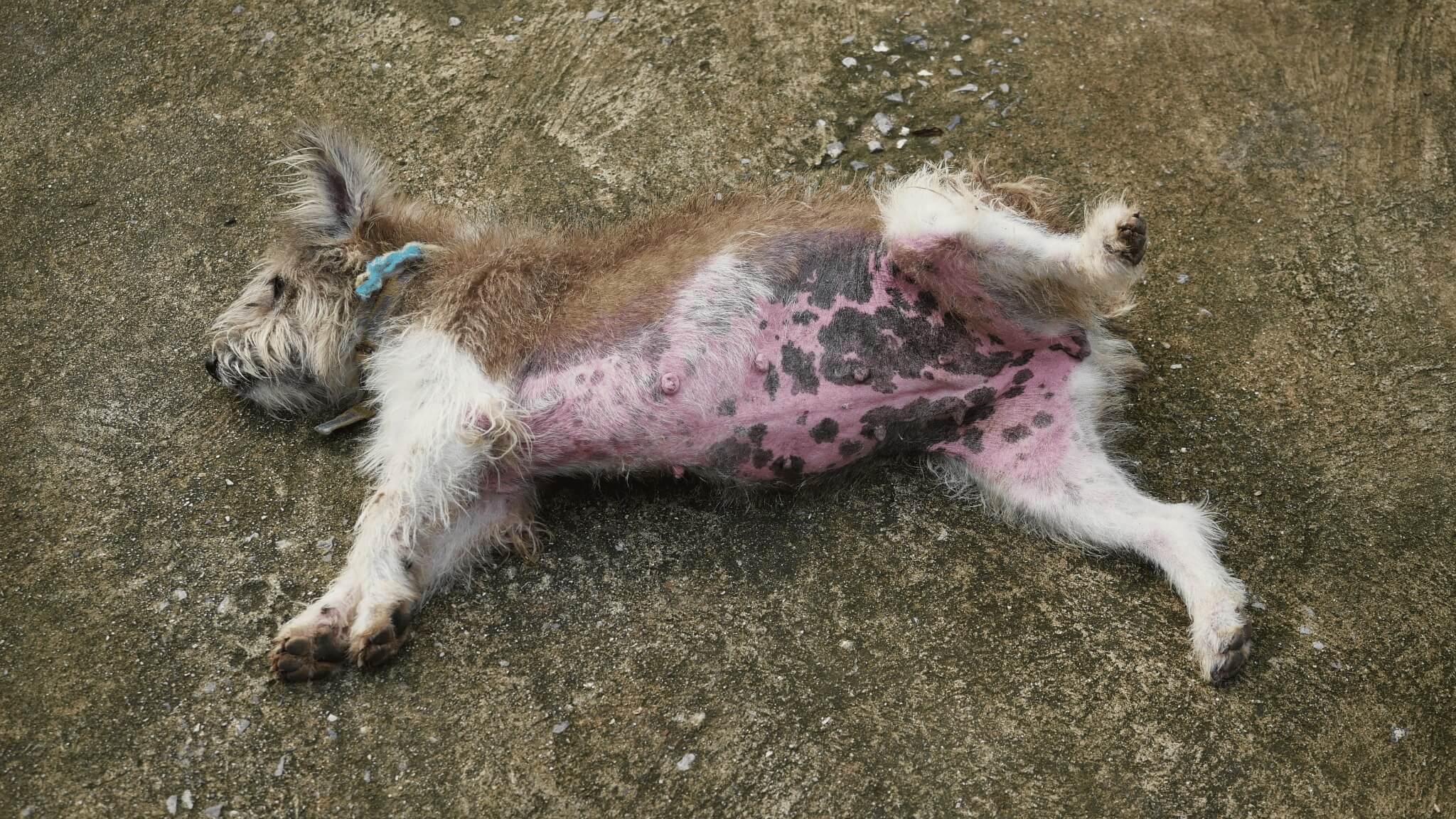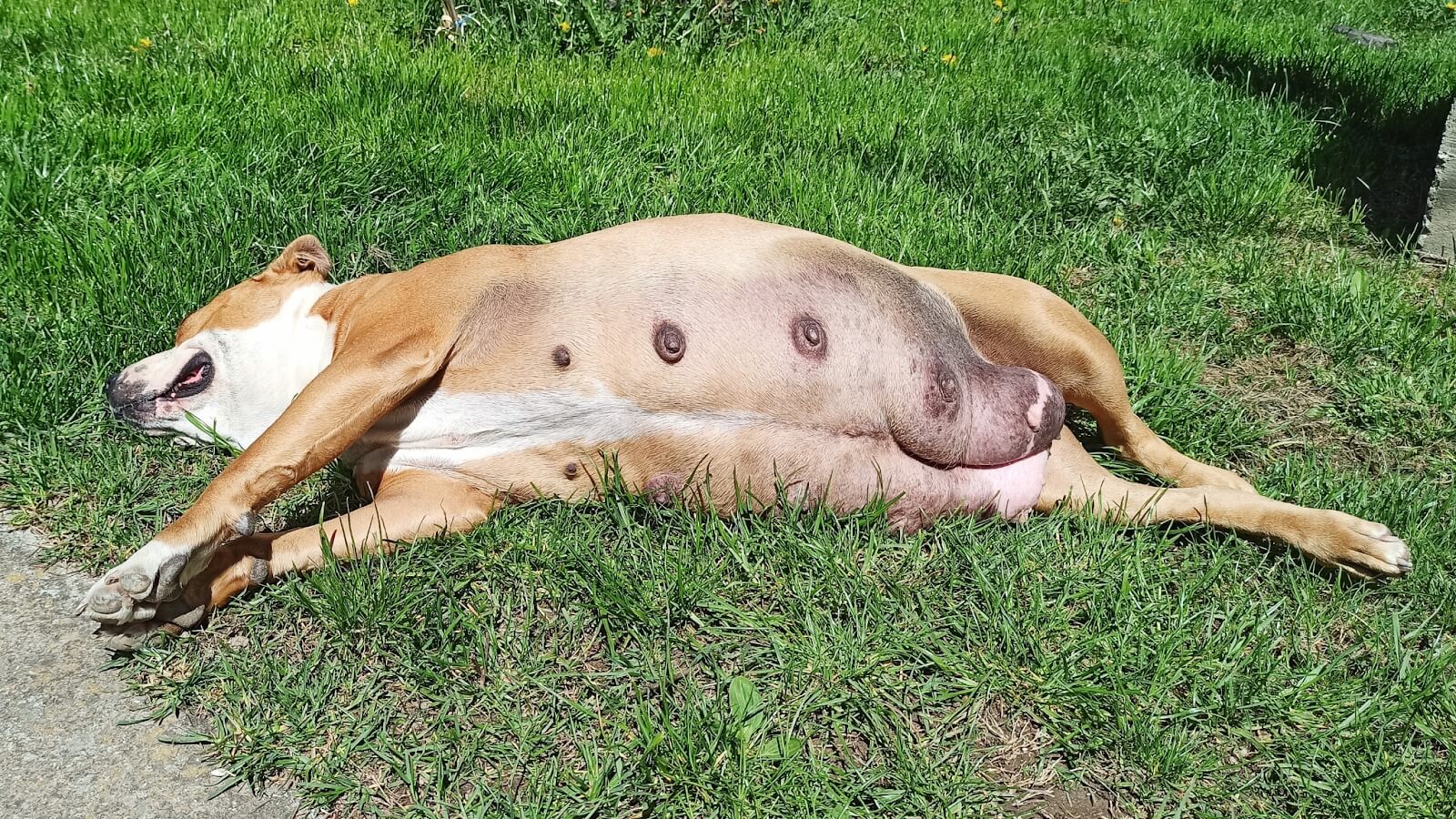Dogs are known to cough occasionally, but if you’re wondering, “ why does my dog cough like he has a hairball?”, it could be a sign of a bigger problem.
The coughing can sometimes reveal horrifying dental odors in your pup, so don’t forget a canine mouth rinse since dental problems can lead to respiratory infections. While the hairball coughing sound is more common in cats, dogs can experience it too.
In some cases, coughing can be a sign of a more serious underlying condition, so it shouldn’t be taken lightly. Like in Laurie Kaplan’s Help Your Dog Fight Cancer, where the simple coughing that sounds like something is stuck in their throat turned out to be frighteningly severe.
So, Why Does My Dog Cough Like He Has a Hairball?
There are several reasons why a dog may cough like they have a hairball. One of the most common causes is kennel cough, which is a highly contagious respiratory infection. Other causes include allergies, heart disease, and lung problems. It is essential to identify the cause of your dog’s coughing to provide proper treatment.
Key Takeaways
- Coughing in dogs can be caused by various conditions, including kennel cough, allergies, heart disease, and lung problems.
- It is crucial to identify the underlying cause of your dog’s coughing to provide proper treatment.
- If your dog is experiencing symptoms such as fever, lethargy, loss of appetite, or difficulty breathing, it is essential to take them to the vet for a proper diagnosis and treatment.
11 Reasons Dogs Cough Like They Have Something Stuck in Their Throat
Coughing in dogs can be caused by a variety of factors. The most common causes of coughing in dogs include hairballs, kennel cough, allergies, bronchitis, heart disease, infections, parasites, respiratory infections, tracheal collapse, and cancer.
If your dog is coughing like they have a hairball, it is crucial to pay attention to other symptoms they may be experiencing. Some common symptoms of coughing in dogs include a fever that can make their ears hot, lethargy, loss of appetite, and difficulty breathing.
1. Kennel Cough
Kennel cough, also known as canine infectious tracheobronchitis, is a highly contagious respiratory disease that can cause coughing, appetite changes, and gagging in dogs. The most common sign of kennel cough is a forceful, hacking cough, almost like a honking sound.
A combination of viruses and bacteria causes the illness and is often spread in areas where dogs congregate, such as kennels, dog parks, and grooming facilities.
2. Allergies
Allergies can also cause coughing in dogs. Common allergens include dust, pollen, and certain foods. Dogs with allergies may also experience itching, sneezing, and the reactions could be why they have a runny nose.
3. Bronchitis
Bronchitis is a condition in which the airways become inflamed, leading to coughing and difficulty breathing. Chronic bronchitis is a common cause of coughing in dogs and may be caused by various factors, including bacteria, viruses, and inflammation.
4. Heart Disease
Heart disease can also cause coughing in dogs. When the heart is not functioning properly, it can lead to fluid buildup in the lungs, which can cause coughing and difficulty breathing.
Heart disease is more common in older dogs and may accompany other symptoms such as panting and exercise intolerance.
5. Common Cold
Dogs can also catch a simple cold, just like humans. This can either be a dry cough that sounds like a hairball is stuck or a wet cough with a runny nose. Other signs include sneezing, fever, watery eyes, and reduced energy.
Common colds in dogs resolve quickly in a few days, especially with treatment. However, in some instances, they can develop into more severe conditions like pneumonia or other secondary infections.
6. Parasites
Parasites, such as heartworms and lungworms, can also cause coughing in dogs. These parasites can affect the respiratory system, leading to coughing, wheezing, and difficulty breathing.
Parasites affecting your dog’s heart and respiratory system are significantly more dangerous than intestinal worms. These worms can cause heart and lung damage and even death if left untreated.
7. Respiratory Infection
Respiratory infections, such as Bordetella bronchiseptica, can also cause coughing in dogs. These infections are highly contagious and can be spread through contact with infected dogs or contaminated surfaces.
Infections may be caused by bacteria, viruses, or other pathogens and can be accompanied by symptoms such as fever, nasal discharge, and lethargy.
8. Tracheal Collapse
Tracheal collapse is a condition in which the cartilage rings that support the trachea become weakened, leading to a collapse of the airway. This can cause coughing, wheezing, and difficulty breathing, particularly during exercise or excitement.
Small breeds like Teacup Maltese and brachycephalic breeds are particularly susceptible to tracheal collapse. This is because their tracheas are tiny and often weaker than those of larger breeds.
9. Cancer
Cancer can also cause coughing in dogs. Tumors in the respiratory system or elsewhere in the body can lead to coughing, wheezing, and difficulty breathing. Diagnosis and treatment of cancer in dogs may require a physical exam, ultrasound, or other diagnostic tests.
Lung cancer is the most common cancer type causing coughing. However, don’t let that worry you just yet because lung cancer is one of the least common reasons your dog is coughing. In fact, studies have shown that lung cancer accounts for only about 1% of all cancer types.
10. Something is Lodged in Their Throat
Sometimes dogs can accidentally inhale or consume foreign particles that get stuck in their respiratory tract. These may cause them to sneeze excessively and even to cough like there is something stuck because there is.
11. Hairballs in Dogs
Hairballs are a common cause of coughing in cats but can also affect dogs. When dogs groom themselves, they may ingest hair, which can accumulate in the stomach and intestines. This can cause a trichobezoar, or hairball, leading to coughing and gagging. In some cases, hairballs can cause an obstruction in the gastrointestinal tract, which may require surgery to remove. Trichobezoars usually happen when a dog has an underlying skin disease, so prevent hairballs, one needs to work with a veterinarian.
Dogs getting hairballs from swallowing people hair they get from brushes or drains, may have pica. We discuss this further in our article on why dogs eat rocks.
Other Symptoms of The Cough in Dogs
When a dog coughs like he has a hairball, there can be many underlying causes. It is important to pay attention to the type of cough, as it can indicate the cause of the issue. Some common causes of coughing in dogs include kennel cough, hairballs, infections, and respiratory issues.
Watch this video and see if you can identify the type of cough in each dog:
Dry Cough
A dry cough is a common symptom of kennel cough, a highly contagious respiratory infection. This type of cough is usually harsh and may sound like the dog is trying to clear something from his throat.
Wet Cough
A wet cough is usually a sign of an infection, such as bronchitis or pneumonia. The presence of mucus characterizes this type of cough and may be accompanied by nasal discharge and fever.
Hacking Cough
A hacking cough is a common symptom of tracheal collapse, which occurs when the cartilage rings that support the trachea weaken and collapse. This cough is usually dry and may sound like the dog is trying to clear something from his throat.
Gagging
Gagging is a common symptom of gastrointestinal obstruction, which occurs when a foreign object or hairball blocks the dog’s intestines. This type of cough is usually accompanied by vomiting and abdominal pain.
Reverse Sneezing
Reverse sneezing is a common symptom of allergies or respiratory irritation. This type of cough is characterized by a rapid inhalation of air that sounds like the dog is gasping for breath.
Collapsing Trachea
Collapsing trachea is a common condition in small dogs and occurs when the cartilage rings that support the trachea weaken and collapse. This type of cough is usually dry and may sound like the dog is trying to clear something from his throat.
Why Does My Dog Sound Like He Has a Hairball But It’s Not Kennel Cough?
There are several reasons why your dog may be coughing like a hairball but not have kennel cough, including allergies, heart disease, tracheal collapse, or respiratory infections. Sometimes, the hairball coughing can result from objects getting stuck in their throat.
If your dog is coughing frequently, it is best to take them to a veterinarian to determine the underlying cause of their cough.
Dog Coughing Like He Has a Hairball Remedies & Treatment
Home Remedies for Dog Coughing Like a Hairball
However, it is essential to note that these remedies may not work for all dogs, and it is best to consult with a veterinarian before trying any home remedies.
Physical Exam
Diagnostic Tests
Treatment Options
It is important to follow the vet’s treatment plan and provide any necessary medication as directed. It is also important to monitor the dog’s symptoms and report any changes to the vet. With proper diagnosis and treatment, most dogs can recover from a cough like they have a hairball.
Frequently Asked Questions (FAQs)
Why is my dog coughing like something is stuck in His Throat?
Why is My Older dog coughing like He has a hairball
Why Does My Dog Have a dry cough and Gags?
What to do when my dog sounds like he has a hairball?
Final Thoughts
Coughing in dogs can be caused by various factors like kennel cough, respiratory infections, parasites, cancer, and foreign objects. Owners should monitor their dogs for symptoms of coughing and seek veterinary care if their dogs experience persistent or severe coughing or other symptoms such as lethargy, decreased appetite, or difficulty breathing.










